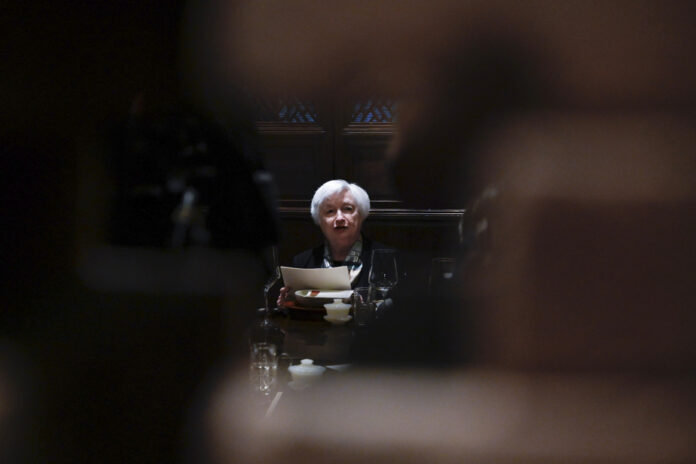(Beijing) The United States and China should speak to each other “directly” over concerns about economic practices and work together on climate change, US Treasury Secretary Janet Yellen said Saturday, on the second day of her visit to Beijing. Beijing.
After his meeting with Ms. Yellen, Deputy Prime Minister He Lifeng lamented that “unforeseen incidents” had hampered the Sino-American relationship, citing the Chinese balloon shot down earlier this year by Washington.
“When we have concerns about specific economic practices, we need to communicate them directly and we will,” Ms. Yellen said during a meeting with He Lifeng, in charge of economic files.
And “the fact that, despite recent tensions, we have reached an all-time high in trade in 2022 suggests that there is ample room for our businesses to engage in trade and investment,” the Commission added. Treasury Secretary at Diaoyutai, the Chinese government’s state villa in Beijing.
Yellen’s visit comes weeks after that of Secretary of State Antony Blinken, in a bid by the Biden administration to renew physical contact with Beijing after three years of near total isolation from China due to the crisis. sanitary.
The meeting between Presidents Xi Jinping and Joe Biden in Bali last November had made it possible to forge “important consensus”, recalled for his part the Chinese Vice Prime Minister, but “unfortunately, due to unforeseen incidents such as that of the airship, there have been some problems in implementing the consensus reached by the two heads of state”.
A Chinese balloon flying over the United States was shot down earlier this year by Washington, which accused it of carrying out surveillance. The episode had caused the postponement at the last minute of Antony Blinken’s visit to Beijing.
Earlier in the day, Yellen had emphasized tackling climate change, a key area of cooperation for Washington, despite strained bilateral relations.
“As we are the two largest emitters of greenhouse gases in the world and the largest investors in renewable energy, we have both the shared responsibility — and the ability — to lead the way,” said Ms. Yellen, who is making his first trip to Beijing since taking office in 2021.
China suspended climate talks last summer in protest at the trip to Taiwan of former US House of Representatives Speaker Nancy Pelosi.
But there are now signs of a lull: On Friday, a State Department official said US climate envoy John Kerry would visit China soon to discuss opportunities for cooperation with Beijing in the fight against climate change.
More broadly, Ms. Yellen played the appeasement Friday, calling in particular on Beijing and Washington to join their efforts on global challenges like debt.
This meeting certainly “set the tone” for the rest of his visit, notes Lyu Xiang, an expert from the Chinese Academy of Social Sciences.
On Saturday, the US Treasury Secretary also shared a meal with female economists, to whom she told the US-China relationship was “rooted in the strong ties” between the two peoples.
“It’s important that we continue to nurture and deepen these ties,” especially as China reopens its economy post-pandemic, she said, noting that the United States may have differences with the Chinese government, but not with his people.
The question is whether “subjects that are part of the global challenges”, such as over-indebtedness and climate cooperation, will be placed at the top of the priorities, wonders Lindsay Gorman, of the American think tank German Marshall Fund.
On Friday, Janet Yellen also met with officials from American companies present in China. The latter expressed their concerns to him in an increasingly uncertain business climate, against a backdrop of geopolitical tensions between the two great powers.
“Anything that can help improve the relationship between the United States and China, firstly, will help businesses here, the investment climate, and secondly, will give us more opportunities to cooperate,” said the AFP Michael Hart, president of the American Chamber of Commerce in China.















